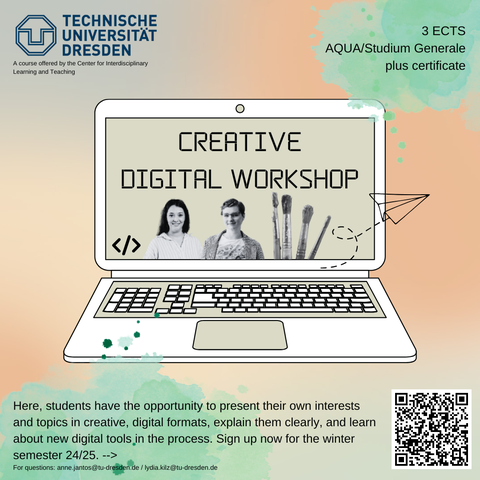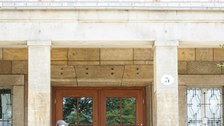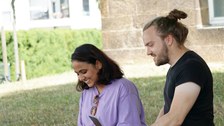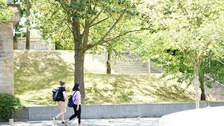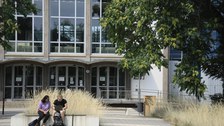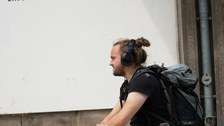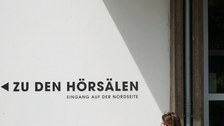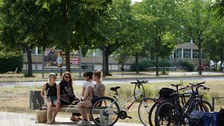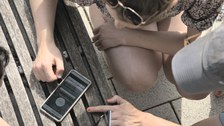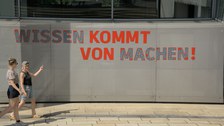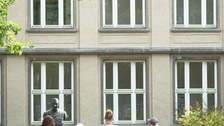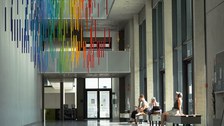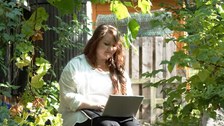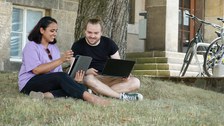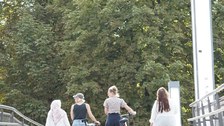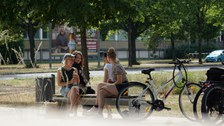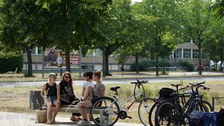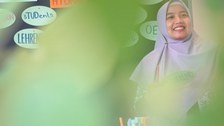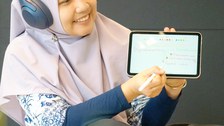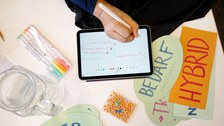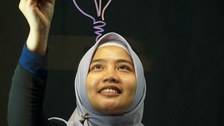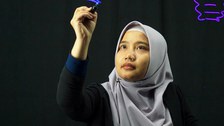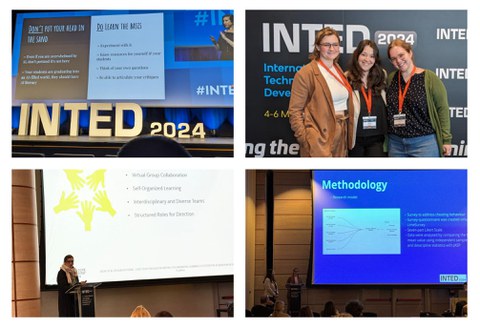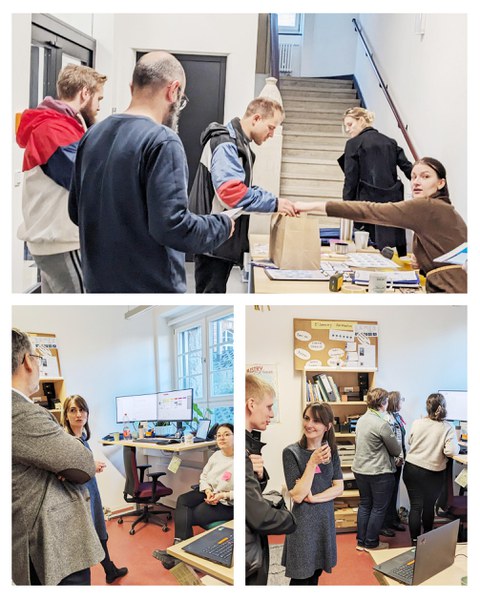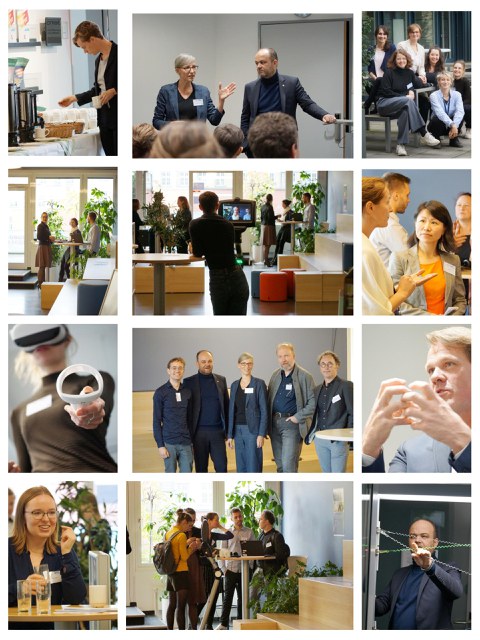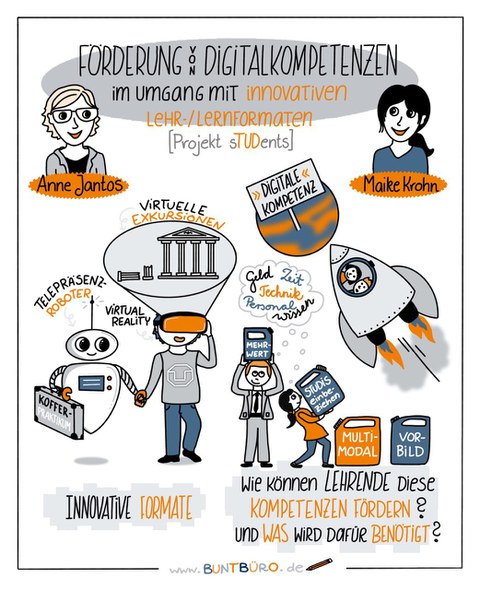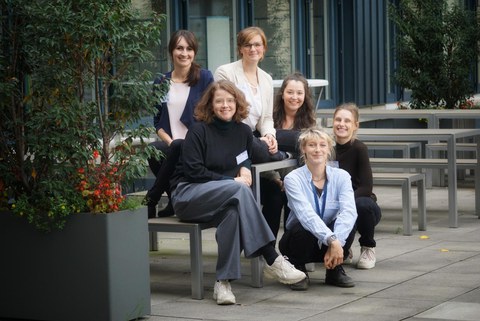sTUDents
The sTUDents sub-project develops and tests innovative teaching formats that focus on student-centricity and the teaching of digital skills.
Various course concepts are developed, evaluated and iteratively refined in close collaboration with student colleagues. This collaborative approach allows us to integrate valuable first-hand feedback and ensure that the teaching formats meet the needs and expectations of the students.
The certificate course "License for digital skills" was created as part of this work. The course offers participants the opportunity to further develop their digital skills in order to move confidently in an increasingly digitalized society.
In the winter semester 24/25
In an increasingly digitalized world, the ability to create and disseminate digital content has become indispensable. The ability to present complex topics and personal interests in understandable and engaging formats is not only important for academic and professional careers, but also for effective communication in different areas of life.
In the Creative Digital Workshop, students are given the opportunity to present their own interests and topics in creative, digital formats, make them understandable and get to know new digital tools.
This semester-long course offers an opportunity to develop projects such as podcasts, infographics, blog posts, vidcasts and much more in active group work. Participants work on a case scenario or bring in topics of their own choice (e.g: Preparing the results of a thesis, presenting the work of an association, explaining jury service, etc.) and independently develop a digital artifact, supported and moderated by the teaching staff.
The course is based on the DigComp 2.2 reference framework and places particular emphasis on the development of skills in the areas of content creation and collaboration. Through intensive support and guidance from teachers, students learn to choose and use the best digital tools for them to present complex issues in an understandable and engaging way. The focus is on a practice-oriented approach that enables students to apply their digital skills in other contexts.
By participating in this workshop...
Participants improve their digital skills: they learn how to use modern digital tools effectively and design their content in an appealing way.
Participants strengthen their communication skills: By creating and presenting projects, they practise communicating complex information clearly and comprehensibly.
Participants expand their teamwork skills: By working with other students, they develop their ability to collaborate and solve problems together.
Prepare participants for the professional world: The skills acquired in the course are in demand in many professional contexts and increase competitiveness on the job market.
Participants experience practice-oriented learning: By directly applying what they have learned in their own projects, the learning process is intensified and the content is firmly anchored.
This course can be credited with 3 ECTS in the AQUA/Studium Generale module (please clarify independently with the responsible Examination Office whether this is possible in your own degree program). At the end, all participants receive a certificate.
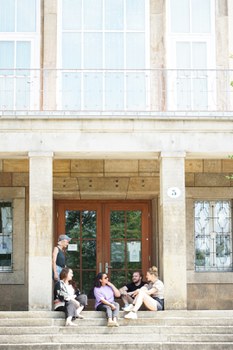
Studierende treffen sich vor dem Weberbau © CC BY NC ND Anne Jantos 20.07.2022
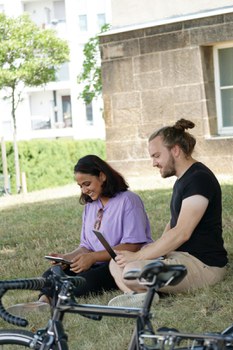
Studierenden beim digitalen Lernen auf dem Campus TUD © CC BY NC ND Anne Jantos 20.07.2022
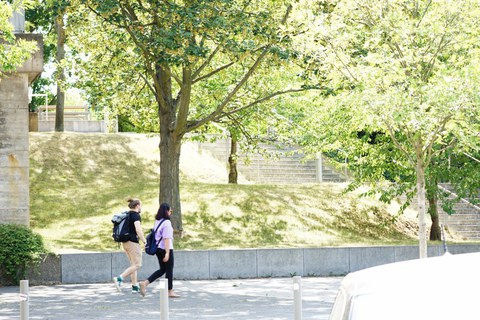
Studierenden laufen über den Campus © CC BY NC ND Anne Jantos 20.07.2022
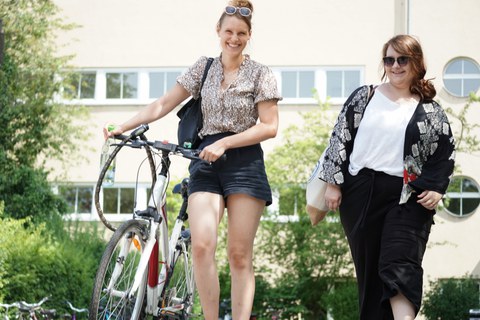
Studierenden laufen über den Campus © CC BY NC ND Anne Jantos 20.07.2022

Studierenden fahren über den Campus © CC BY NC ND Anne Jantos 20.07.2022
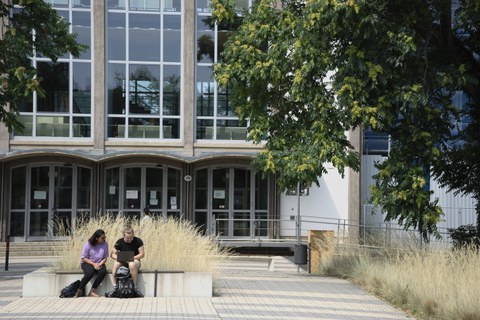
Studierenden arbeiten gemeinsam vor dem Andreas-Schubert-Bau © CC BY NC ND Anne Jantos 20.07.2022
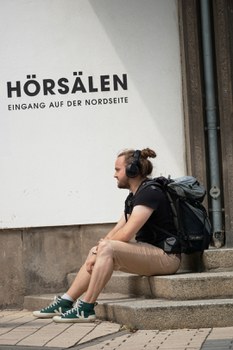
Studierender wartet auf die Vorlesung © CC BY NC ND Anne Jantos 20.07.2022
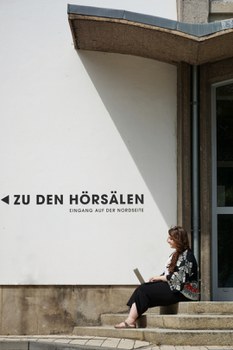
Studierende arbeitet vor dem Andreas-Schubert-Bau © CC BY NC ND Anne Jantos 20.07.2022
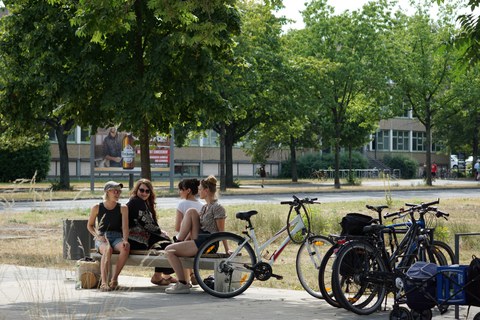
Studierenden beim digitalen Lernen auf dem Campus TUD © CC BY NC ND Anne Jantos 20.07.2022

Studierende auf dem Campus © CC BY NC ND Anne Jantos 20.07.2022
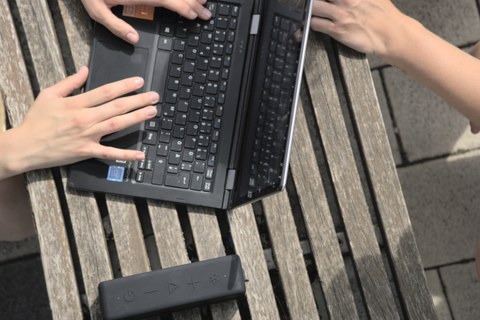
Studierenden beim digitalen Lernen auf dem Campus TUD © CC BY NC ND Anne Jantos 20.07.2022
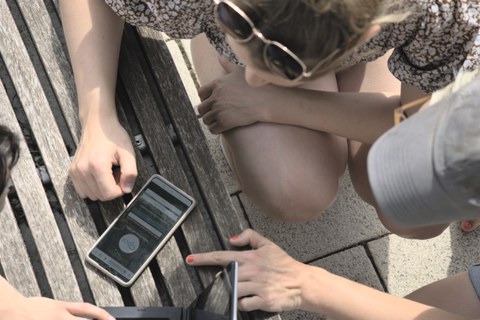
Studierenden beim digitalen Lernen auf dem Campus TUD © CC BY NC ND Anne Jantos 20.07.2022
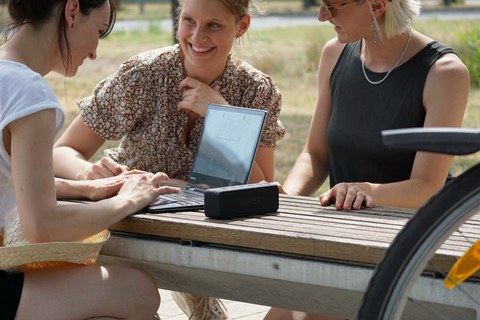
Studierenden beim digitalen Lernen auf dem Campus TUD © CC BY NC ND Anne Jantos 20.07.2022
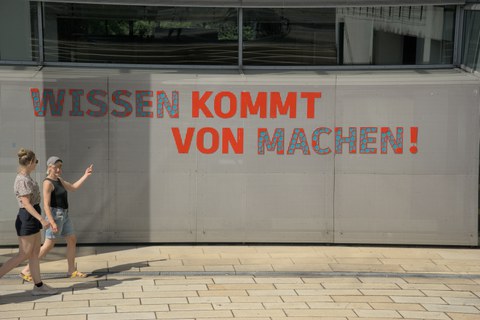
Studierenden laufen vor der SLUB Maker Space © CC BY NC ND Anne Jantos 20.07.2022

Studierenden beim digitalen Lernen auf dem Campus TUD © CC BY NC ND Anne Jantos 20.07.2022

Studierenden beim digitalen Lernen auf dem Campus TUD © CC BY NC ND Anne Jantos 20.07.2022

Studierenden beim digitalen Lernen auf dem Campus TUD © CC BY NC ND Anne Jantos 20.07.2022

© CC BY NC ND Anne Jantos 20.07.2022
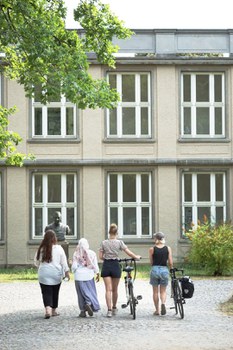
© CC BY NC ND Anne Jantos 20.07.2022
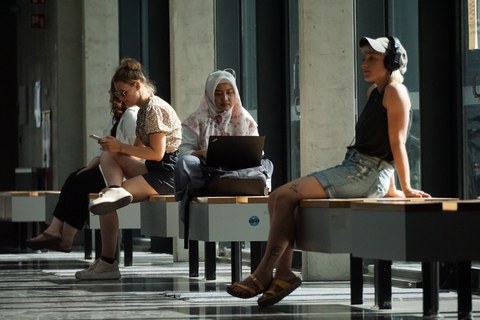
© CC BY NC ND Anne Jantos 20.07.2022
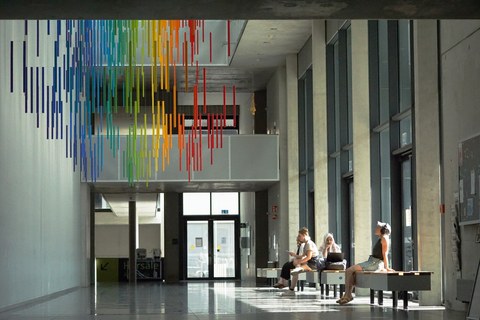
© CC BY NC ND Anne Jantos 20.07.2022
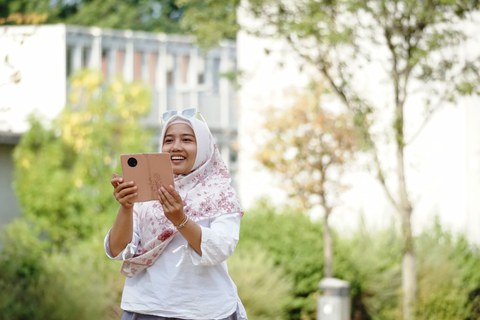
© CC BY NC ND Anne Jantos 20.07.2022
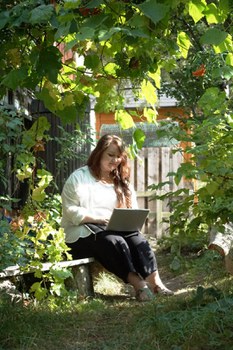
© CC BY NC ND Anne Jantos 20.07.2022

Studierende sitzen sich unterhaltend auf einer Wiese. © CC BY NC ND Anne Jantos 20.07.2022
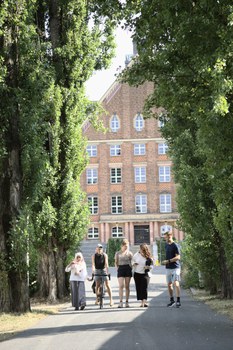
© CC BY NC ND Anne Jantos 20.07.2022
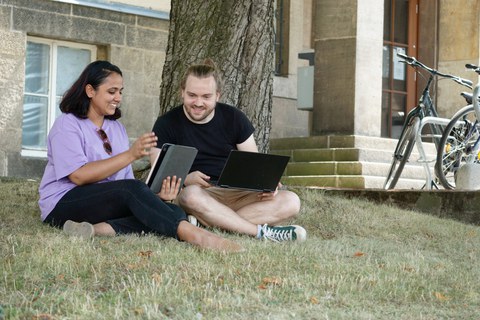
© CC BY NC ND Anne Jantos 20.07.2022

© CC BY NC ND Anne Jantos 20.07.2022
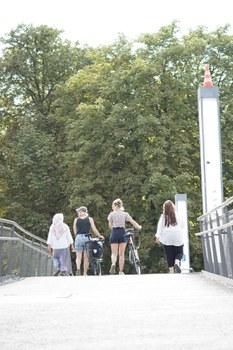
© CC BY NC ND Anne Jantos 20.07.2022
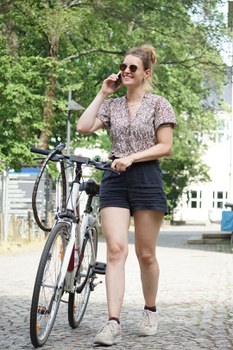
© CC BY NC ND Anne Jantos 20.07.2022
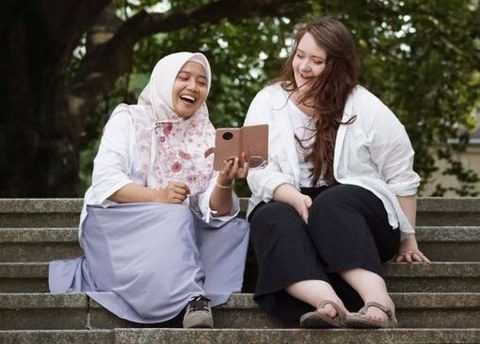
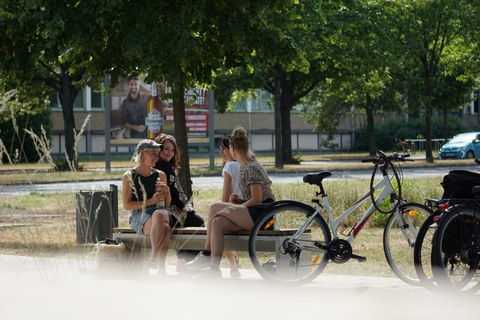
© CC BY NC ND Anne Jantos 20.07.2022
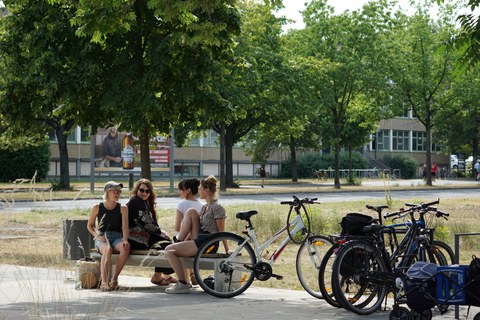
© CC BY NC ND Anne Jantos 20.07.2022
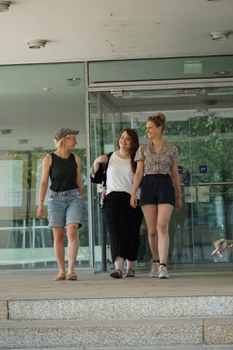
© CC BY NC ND Anne Jantos 20.07.2022

© CC BY NC Anne Jantos 22.12.2022
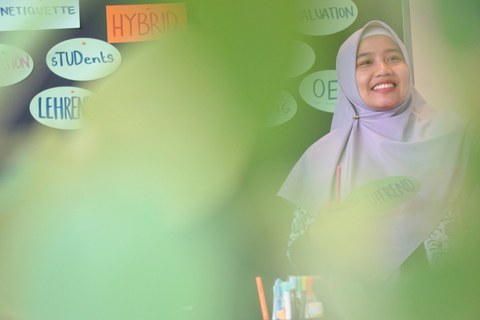
© CC BY NC Anne Jantos 22.12.2022
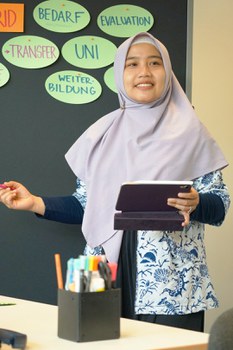
© CC BY NC Anne Jantos 22.12.2022
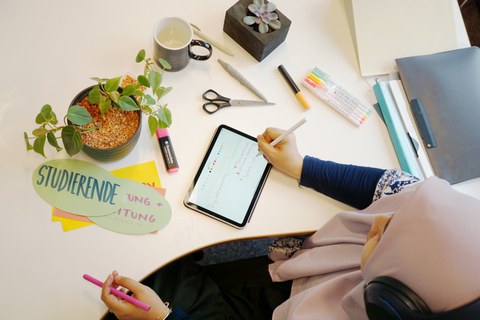
© CC BY NC Anne Jantos 22.12.2022
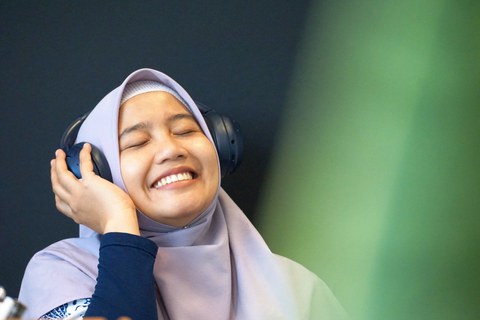
© CC BY NC Anne Jantos 22.12.2022
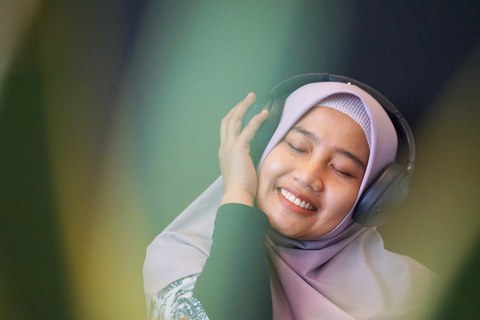
© CC BY NC Anne Jantos 22.12.2022
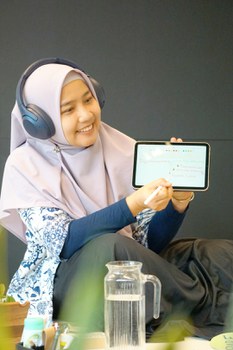
© CC BY NC Anne Jantos 22.12.2022
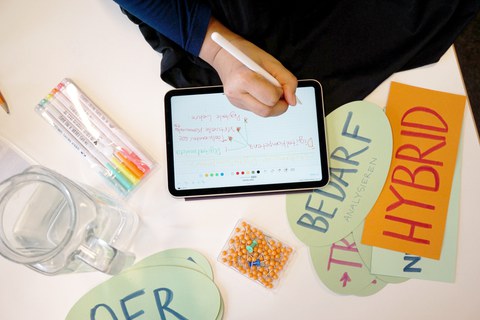
© CC BY NC Anne Jantos 22.12.2022
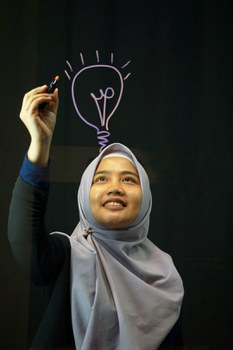
© CC BY NC Anne Jantos 22.12.2022
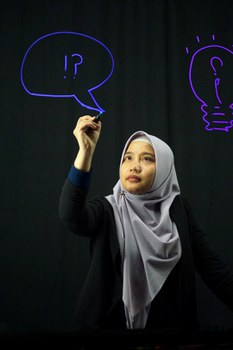
© CC BY NC Anne Jantos 22.12.2022
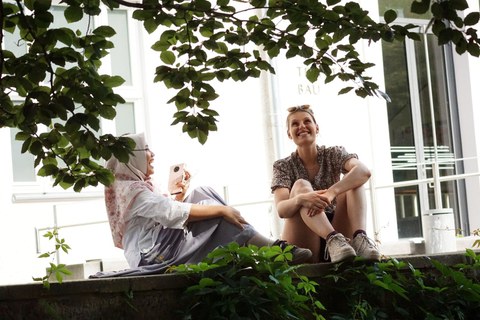
© CC BY NC ND Anne Jantos
INTED24 Valencia March 2024
The International Technology, Education and Development Conference (INTED) 2024 in Valencia was once again a shining example of the ongoing dialog and innovation in the field of digital education. As a meeting point for professionals, educators and researchers from around the world, the conference served as a platform for the exchange of ground-breaking ideas and practice-oriented solutions aimed at reshaping the landscape of education in the digital age. Valencia, with its rich history and cultural diversity, provided the perfect backdrop for a conference that focused on the future of education in our increasingly connected world. In between sessions, participants had the opportunity to enjoy the city's stunning architecture, vibrant markets and warm hospitality, which made the experience even more enriching. We were able to contribute our topics as presentations - offering important insights into the design of digital learning environments and the challenges of virtual exams.
Didactic design patterns: case studies for virtual collaborative learning
Anne Jantos presents the development of digital skills through virtual collaborative learning (VCL). The use of case studies in VCL environments was highlighted as an essential approach to bridge the gap between theory and practice and to promote the acquisition of digital competences. The study emphasized that careful design of case studies is crucial to effectively develop students' digital skills in authentic contexts. By applying didactic theories and specific design patterns for VCL, this approach provides practical guidelines for educators aiming to enhance digital skills development in their courses.
Online vs. face-to-face exams: Deterrence theory and cheating behavior
Lydia Kilz presented the comparison of online and face-to-face exams and the associated cheating behavior. The study, based on a survey of 215 students, shed light on how perceptions of cheating opportunities and fear of detection influence cheating behavior in different exam environments. The results showed that students perceive a higher potential for cheating in online exams and are therefore more likely to engage in dishonest behavior. These findings call for a re-evaluation of assessment strategies in virtual learning environments and suggest that raising the level of challenge of tasks can effectively reduce cheating.
Impact of AI on DigCompEdu for HE Teaching
Anne Jantos and Lisa-Marie Langesee presented a study on the impact of AI on the competences of HE teachers according to the DigCompEdu framework. The study with 42 teachers from eleven German universities showed a positive perception of AI tools for the 22 DigCompEdu competencies. The study recommends that universities support teachers in integrating AI into teaching in order to improve the quality of education. This presentation underlines the role of AI in the development of future-proof teaching skills.
Completion of the certificate course "Driving license for digital skills"
ZiLL discovery tour
Prospective conference November 2023
Kick-off certificate course "Driving license for digital skills"
IDIMT 2023 Hradec Kralove September 2023
HDS summer party in Leipzig August 2023
E-Teaching Day 2022
INTED23 Valencia March 2023
GeNeMe2022 October 2022
Photo session for the OER Library July 2022
Lessons Learned 2022
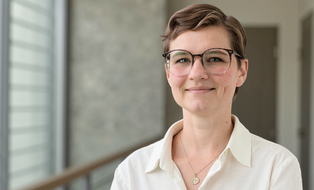 © Anne Jantos
© Anne Jantos
Research Associate
NameAnne Jantos Dipl.-HDL.
LiDiCo
Send encrypted email via the SecureMail portal (for TUD external users only).
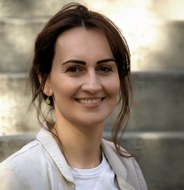 © Maike Krohn
© Maike Krohn
Research Associate
NameMaike Krohn M.Sc.
CampusConnect – Sharing Innovative Education; LiDiCo
Send encrypted email via the SecureMail portal (for TUD external users only).
 © Lydia Kilz
© Lydia Kilz
Project Staff
NameLydia Kilz M.A.
LiDiCo
Send encrypted email via the SecureMail portal (for TUD external users only).
- Students:
- Luisa Klatte
- Nora Hofmann
- Sabrina Hänsel
- Victoria Helbig
- Clara Müller



